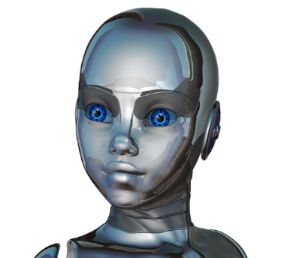Robots R Us
Original article was first published in Psych Central

"[In the future] your own brain might end up being the last place you search for information.
-- Phil Libin (CEO, Evernote)
High-tech scenarios of sinister robots replacing humans (once-imagined in the pages of pulp sci-fi) have returned to haunt our mortal skulls.
Bill Gates and others fear that artificial intelligence could supplant the human genius that created it.
In the future, the robot "Bill of Rights" immortalized in Asimov's The Three Laws of Robotics could become a Declaration of Independence from the master race, known as Humans.
Realistic warnings from the experts continue to speculate that a super-computer like HAL 9000 or Colossus could infiltrate our global networks to inflict insidious control. (Especially in the military, with the rise of drones and other robotic warrior technology.)
Smart thinkers like Stephen Hawking, Steve Wozniak and Elon Musk are discussing brilliant suggestions to protect humans from their rebellious artifacts, but there's no fail-safe resolution.
"Humans," according to Stephen Hawking, who are "limited by slow biological evolution, couldn't compete and would be superseded by A.I."
On the Web and elsewhere, it seems the glut of gloom is reaching critical mass…
Some minority reports suggest A.I. could become our friend, but the consensus of expert opinion on the likelihood of blissful coexistence sounds increasingly dubious.
Perhaps our struggle to understand Homo Siliconicus is dependent upon the so-called X Factor of what it means to be Human: Our fluke of genius. Our free will. But keep in mind: Gene-control techniques in the Lab are creating Humans of different order. Will genetically-modified Homo Sapiens be more like A.I. in social conduct — or more like us?
The possibilities for future shock seem endless. How do we cope in a world where the X Factor can be redefined as a circuit: one perhaps inscribed with free will?
Even the smartest Jeopardy! contestant cannot answer that.
The ultimate challenge could be existential: Our machine alter egos could morph into a threat to our self-esteem; the result could degenerate into a global identity crisis.
Intelligent algorithms like ourselves (working together with artifacts like HAL 9000 or C-3PO) could blur the distinctions between Us and Them forever.
Our brain child could unleash a death star of social and political implications. On the other hand, the umbilical plug cannot be pulled. Curtailing A.I. technologies would "only push them underground where development would continue unimpeded by ethics and regulation." (Ray Kurzweil.)
Despite the flurries of legitimate protest, perhaps it's time to keep cool and reflect. In a world of self-driven cars and speech-recognition services like Alexa, ultimately our Brave New World might offer us a chance for grateful surrender. If Kurzweil is right, there's no turning back. The die has already been cast.
Perhaps a harbinger of Things to Come can be found in an old Twilight Zone episode, about a man who skins open his hand and discovers a circuit of wires and cables underneath. As we peer deeper and deeper into the atoms of cold metal and intricate code, it seems the flesh that we unearth has come to mirror our own.
In the end I think it is best in the human quest to seek alliance in the hope of future accord, so let's bless the Sacrament (with caution) and inspire it to perfection.
Return to Mind Bluff
Bio
John DiPrete has contributed to MacWorld, Perceptual and Motor Skills, Medical Hypotheses, Speculations in Science and Technology, among other outlets. His Web site (www.MindBluff.com) has been recommended by PC World Online. Readers can subscribe to his free email updates at http://mindbluff.com/subscribe.htm.
